- Home
- News & Features
- News
- FY2019
- Enabling children with disabilities in Mongolia to demonstrate their potential through individualized learning
News
December 19, 2019
Enabling children with disabilities in Mongolia to demonstrate their potential through individualized learning
JICA has provided various forms of assistance to enable children from around the world to attend school, live safely, and demonstrate their potential. One such initiative is “The Project for Strengthening Teachers’ Ability and Reasonable Treatments for Children with Disabilities (START),” which has been implemented in Mongolia for four years up to July 2019.
Currently, the net enrollment rate in primary schools is approximately 96% in Mongolia. However, many children with disabilities are unable to attend or drop out of school due to insufficient educational environments and the inability to receive appropriate guidance. In order to improve this situation, JICA has worked to strengthen early childhood interventions and improve the quality of education for children with disabilities. The guidelines developed in the project have been approved by the Minister of Labor and Social Protection, the Minister of Education, Culture, Science and Sports, and the Minister of Health, and are the roadmap for future comprehensive support.
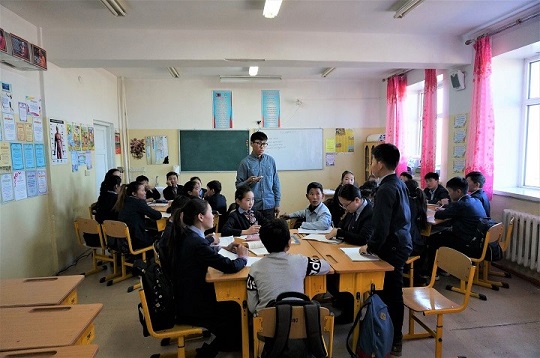 A class at a pilot school in Khuvsgul Province, where JICA’s “Project for Strengthening Teachers’ Ability and Reasonable Treatments for Children with Disabilities,” was implemented. Mongolia promotes inclusive education for children with and without disabilities
A class at a pilot school in Khuvsgul Province, where JICA’s “Project for Strengthening Teachers’ Ability and Reasonable Treatments for Children with Disabilities,” was implemented. Mongolia promotes inclusive education for children with and without disabilities
Providing early developmental support through the introduction of regular health checkups
One of the accomplishments of this project is the introduction of regular health checkups. At the beginning of the project, children aged 5-16 were expected to be the target range to receive support. However, in Mongolia, where the enrollment rate in kindergartens is 80% or more, education starts at the age of two when children are admitted to kindergarten. As pre-kindergarten support, health checkups were conducted for children aged 1 year and 6 months in the pilot areas of Ulaanbaatar and Khuvsgul Province.
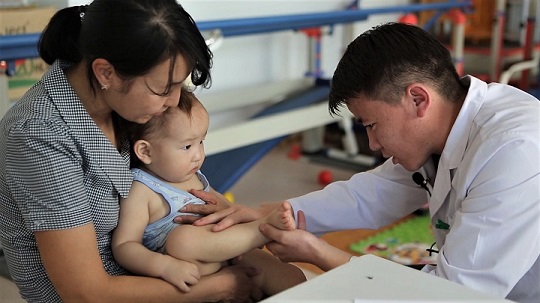 18-months Health Checkup (Bayangol District, Ulaanbaatar). Despite the short preparation period of about two months, approximately 70% of the target households participated
18-months Health Checkup (Bayangol District, Ulaanbaatar). Despite the short preparation period of about two months, approximately 70% of the target households participated
Before the health checkup, training was given to healthcare professionals, and the use of the Maternal and Child Health Notebook was promoted so that they can confirm proper development. As a result of the checkup, children suspected of having developmental delays or disabilities were provided with support in the Parents and Child Development Program, where play is incorporated into a program to stimulate their development, was conducted. The Parents and Child Development Program provided necessary information and advice to parents who were anxious about their children’s development.
The parents who participated in the checkups said, “I vaguely thought that my child was fine. However, when I visited the hospital, I realized that it was a valuable opportunity for me to be aware of what needs to be done and teach me how to prepare my child for entering kindergarten.” Until then, many parents who were anxious about their child’s development had no choice but to live with it, and those whose child was diagnosed as having a disability had no support. However, a model case was created that enabled them to prepare prior to starting their social life.
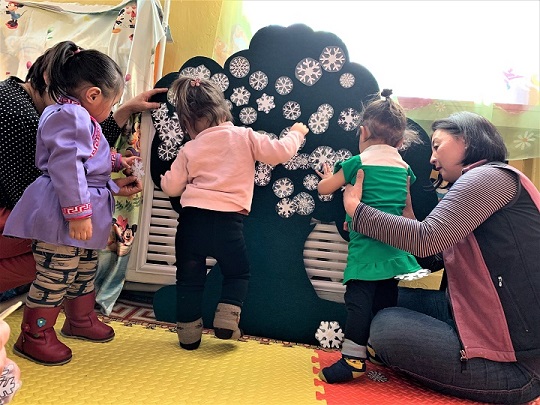 Parents and Child Development Program held at Kindergarten No. 4 in Khovsgol Province. It has contributed to the interaction between parents who have children with disabilities and the prevention of isolation of these families
Parents and Child Development Program held at Kindergarten No. 4 in Khovsgol Province. It has contributed to the interaction between parents who have children with disabilities and the prevention of isolation of these families
Changes seen in the classroom through improvement of educational systems and teaching materials
At the same time, educational services have been improving for children with disabilities after entering school. In Mongolia, the “National Program on Inclusive Education” was implemented from 2003 to 2008. Although children with disabilities can also attend school, in reality, there were numerous issues. There were children who were refused admission by schools because they wanted children with disabilities to go to special schools, and there were children who simply were unable to follow the class and just sat writing in one corner of the classroom.
Therefore, efforts were made to improve the physical environment of pilot schools, establishing resource rooms that allow children with disabilities to receive lessons in accordance with their needs, and implementing advisory activities by teachers at special schools.
Mr. Tetsuya Ishii (Koei Research & Consulting Inc.), the project leader, stated that one of the reasons why children with disabilities face difficulties in school was the lack of knowledge and skills of teachers. “For children with disabilities, we have created individualized education plans, and have identified and targeted individual educational needs and goals.”
“Teachers tended to think about age-based goals, such as “second-year students need to do multiplication,” but in the project, through advisory activities by teachers of special schools, they were instructed to set goals tailored to each child, for example, “matching the numbers from 1 to 5 with the actual objects.” By setting realistic goals, children will gradually increase their ability to do things, and teachers can also feel the growth of their children. As a result of these experiences, the attitudes of schools, and teachers toward children with disabilities have changed.”
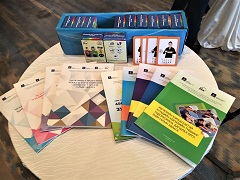 Handbooks and teaching materials created in the project. By using the same teaching materials and documents, high-quality education is available anywhere in the country
Handbooks and teaching materials created in the project. By using the same teaching materials and documents, high-quality education is available anywhere in the country
Also, in order to support teachers, the project has prepared a handbook on teaching methods and teaching materials for teachers. One example of this is the “Collection of Illustrations: 450 useful words at school,” which can be downloaded by anyone.
Moving the three ministries to support the entire country
The “Guidelines for Comprehensive Early Childhood Development for Children with Disabilities,” which summarize the guidelines and contents of development support through projects and the roles of related organizations, such as health checkups for children aged 1 year and 6 months, and the establishment of education models at schools, was approved as a joint order of the Minister of Labor and Social Protection, the Minister of Education, Culture, Science and Sports, and the Minister of Health, on Nov. 15, 2018. It is expected to serve as a guideline for structuring developmental support systems and concrete implementation throughout the country going forward.
Children have the right to receive an education, whether they have disabilities or not. JICA will continue to support the protection of children’s rights and freedoms.
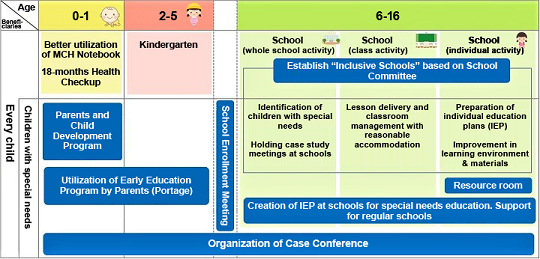 A comprehensive menu of support necessary for children in Mongolia
A comprehensive menu of support necessary for children in Mongolia
- About JICA
- News & Features
- Countries & Regions
- Our Work
- Thematic Issues
- Types of Assistance
- Partnerships with Other Development Partners
- Climate Change / Environmental and Social Considerations
- Evaluations
- Compliance and Anti-corruption
- Science and Technology Cooperation on Global Issues
- Research
- JICA Development Studies Program / JICA Chair
- Support for the Acceptance of Foreign HRs / Multicultural and Inclusive Community
- Publications
- Investor Relations





